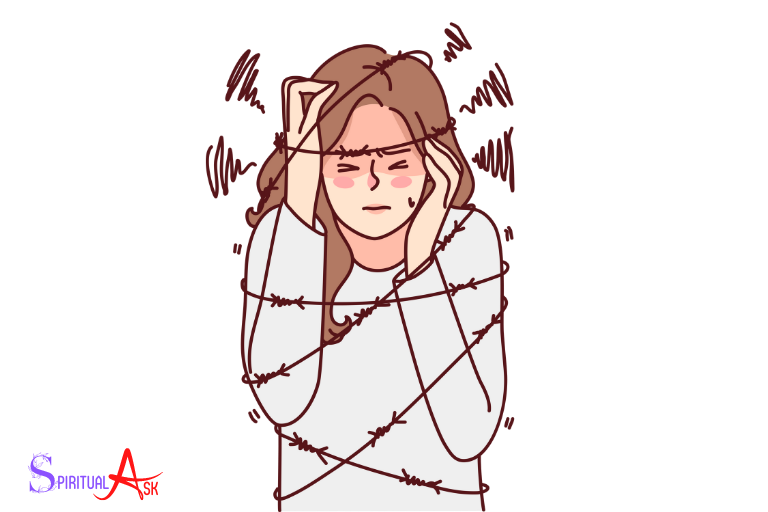Bipolar and Spiritual Warfare: Everything You Need to Know!
Helping individuals with bipolar disorder navigate their spiritual path can be challenging but insightful. Discover how weaving mental health and spiritual warfare can ultimately lead to healing and inner growth.
Bipolar disorder and spiritual warfare are closely intertwined as people with bipolar disorder may experience spiritual battles which intensify their struggle.
Understanding the connection between bipolar disorder and spiritual warfare allows one to implement holistic approaches in managing symptoms.
Integrating mental health strategies and spiritual grounding can lead to more effective coping mechanisms and lasting personal growth.

Key Takeaway
6 Aspects: Bipolar Disorder & Spiritual Warfare
| Aspect | Bipolar Disorder | Spiritual Warfare |
|---|---|---|
| Definition | A mental health disorder characterized by extreme mood swings, including episodes of mania and depression. | A struggle between good and evil forces, often perceived as a battle between angels, demons, or other spiritual beings. |
| Causes | Genetic factors, brain chemistry imbalances, environmental factors, and stress. | Belief in the influence of supernatural forces, personal faith, religious beliefs, and cultural factors. |
| Symptoms | Mood swings, irritability, impulsiveness, excessive energy or lethargy, sleep disturbances, and suicidal thoughts. | Feelings of oppression, spiritual attacks, intense fear, loss of faith, and negative thoughts. |
| Treatment | Medication (such as mood stabilizers and antidepressants), therapy, and lifestyle changes. | Prayer, fasting, spiritual counseling, deliverance or exorcism, and increased religious devotion. |
| Outcome | With proper treatment, people with bipolar disorder can lead stable, healthy lives. However, the disorder is chronic and requires ongoing management. | Outcomes vary widely, depending on the individual’s beliefs, faith, and response to spiritual interventions. Some people may experience relief and increased spiritual well-being, while others may continue to struggle. |
| Societal Perception | There is still stigma surrounding mental health disorders, but awareness and understanding of bipolar disorder is increasing. | Spiritual warfare is often seen as a deeply personal and subjective experience, and beliefs about its existence and impact vary widely. |
Understanding Bipolar Disorder
Bipolar disorder is a clinically complex mental health condition characterized by significant mood swings that include emotional highs (mania or hypomania) and lows (depression).

You’re dealing with a brain disorder where your mood can shift in dramatic ways, impacting your energy, activity levels, and ability to carry out day-to-day tasks.
While the exact cause isn’t fully understood, it’s linked to genetics, brain structure, and chemistry, as well as environmental factors.
You must recognize that this isn’t just about feeling up or down; it’s a severe condition that requires a proper diagnosis and comprehensive treatment plan.
A blend of medication, psychotherapy, and lifestyle adjustments can help manage symptoms and improve your quality of life.
Defining Spiritual Warfare
Spiritual warfare, in many religious contexts, refers to the perceived battle between forces of good and evil, where individuals may feel they’re facing struggles beyond their physical world.

This concept, while deeply rooted in various faith traditions, often intersects with psychological experiences, such as those encountered with bipolar disorder.
To break it down:
- Cosmic Conflict: The belief in a universal battle between divine and malevolent entities.
- Personal Trials: The interpretation of personal challenges as manifestations of this larger conflict.
- Mental Health Intersection: Understanding how mental health conditions can be influenced by or mistaken for spiritual experiences.
- Coping Mechanisms: The use of faith-based practices in managing psychological symptoms, which may complement clinical interventions.
In this analysis, it’s crucial to differentiate between metaphorical language and actual psychological conditions, ensuring that individuals receive appropriate care.
The Bipolar-Spiritual Nexus
Exploring the link between bipolar disorder and spiritual warfare reveals how subjective spiritual experiences can intertwine with the clinical symptoms of this mental health condition. Exploring this intersection often highlights how individuals might interpret manic or depressive episodes through a spiritual lens, assigning meaning to their heightened emotions or altered states. The seizures and spiritual warfare connection also emerges in some narratives, as people experiencing psychosis or extreme mood swings may perceive these intense moments as battles between good and evil forces. This complex interplay underscores the importance of cultural and personal beliefs in shaping how mental health conditions are understood and managed.

You’ll find that the expansive moods of mania might be fertile ground for what some interpret as spiritual encounters or battles.
Elevated states can include feelings of euphoria, invincibility, or a sense of being chosen, which may mimic or be mistaken for religious ecstasy or spiritual awakening.
Conversely, the depressive episodes can be perceived as spiritual abandonment or attack, with deep despair and hopelessness echoing themes of demonic oppression.
It’s crucial to discern the psychological underpinnings from spiritual interpretations to ensure that you receive appropriate treatment.
Understanding this nexus is key to providing holistic care that respects both mental health science and personal belief systems.
Symptoms and Spiritual Interpretations
You must recognize the clinical symptoms of bipolar disorder, which include mood swings from manic highs to depressive lows.

These manifestations may have spiritual interpretations that some individuals believe reflect a battle between metaphysical forces.
It’s crucial to balance these perspectives while developing strategies to manage the interplay of mental health and spiritual experiences.
Identifying Bipolar Manifestations
When examining the manifestations of bipolar disorder, it’s crucial to distinguish between clinical symptoms and potential spiritual interpretations.
Your understanding of this distinction can profoundly impact both your perspective and approach to managing the condition.
Consider the following well-documented symptoms:
- Mood Swings: Clinical view sees these as extreme fluctuations between depression and mania. Spiritually, some may interpret these shifts as battles between darkness and light.
- Energy Levels: Clinically, alternating periods of lethargy and hyperactivity are noted. Spiritually, this could be seen as varying degrees of spiritual vitality or oppression.
- Thought Processes: Racing thoughts in bipolar disorder are clinically recognized. Spiritually, this might be considered a form of mental torment or an influx of inspiration.
- Sleep Patterns: Disrupted sleep is a common symptom, which in a spiritual context, could reflect inner turmoil or enlightenment periods.
Spiritual Meaning Behind Symptoms
Delving into the spiritual meanings behind bipolar symptoms requires a nuanced understanding of how these manifestations may resonate on a metaphysical level.

You should consider that while some may interpret mood fluctuations as indicative of spiritual unrest or battles, such interpretations lack empirical support.
Clinically, bipolar disorder is characterized by alternating episodes of mania and depression, each with distinct symptoms that can significantly impact your life.
Analytically, linking these symptoms to spiritual causes can be controversial and may detract from evidence-based treatments.
It’s essential to approach this topic with caution, recognizing the need for a balance between spiritual beliefs and medical advice.
As you seek understanding, prioritize approaches that are rooted in scientific research and offer concrete support for managing bipolar disorder.
Coping With Dual Realms
Navigating the complexities of bipolar disorder requires a careful balance between acknowledging the clinical symptoms and respecting individual spiritual interpretations.
To manage this effectively:
- Recognize the clinical signs such as mood swings, depression, and mania, and seek appropriate medical treatment.
- Understand that personal beliefs about spiritual warfare may coexist with bipolar disorder; integrate this into your coping strategies.
- Engage with healthcare professionals who are sensitive to your spiritual perspective and can provide holistic care.
- Establish a support network that values both your mental health needs and spiritual experiences.
In doing so, you’ll find a tailored approach that encompasses both realms, ensuring that your treatment plan is comprehensive and respects your unique perspective on your condition and its broader implications.
Navigating Manic Episodes

As you encounter manic episodes, it’s critical to identify the signs early, such as increased energy, reduced need for sleep, or impulsive behaviors.
You’ll need to employ self-management strategies like mood tracking and establishing sleep routines to mitigate the intensity of these episodes.
Concurrently, seeking professional support is essential to tailor a treatment plan that incorporates medication management, psychotherapy, and possibly a spiritual framework, should it align with your beliefs.
Recognizing Manic Symptoms
Understanding the hallmark symptoms of a manic episode can be crucial in seeking timely and effective treatment for bipolar disorder.
When you’re experiencing mania, your emotions and behaviors may significantly fluctuate, often with an intensity that’s unmistakable.
It’s essential to recognize these changes:
- Elevated Mood: You might feel an unusual level of optimism, energy, and euphoria.
- Increased Activity: You may engage in multiple projects or activities with a noticeable escalation in goal-directed behavior.
- Rapid Speech: Your thoughts might race, leading to pressured speech that’s hard for others to interrupt.
- Impulsive Behavior: There’s often a marked increase in risky activities, such as excessive spending or reckless driving.
Being aware of these signs helps you and your healthcare provider to manage your condition effectively.
Strategies for Self-Management
Frequently, individuals with bipolar disorder find that developing a robust set of self-management strategies significantly mitigates the impact of manic episodes on their daily lives.
It’s essential to establish a routine that encompasses regular sleep patterns, medication adherence, and mindfulness practices. These elements are clinically proven to stabilize mood fluctuations.

You should also cultivate awareness of early warning signs and triggers, allowing for timely intervention. Structured planning helps avoid impulsive decisions common during mania.
Engage in activities that require focus and calmness, which can serve as grounding techniques. Additionally, maintaining a support network is critical; it provides external perspective and accountability.
You must collaborate with healthcare providers to tailor these strategies to your specific needs, ensuring they’re both effective and sustainable.
Seeking Professional Support
While self-management strategies form a crucial foundation, securing professional support is key to effectively navigating manic episodes in bipolar disorder. Professional intervention is essential for a comprehensive treatment plan.
Here are the critical components of professional support:
- Medication Management: Working with a psychiatrist to find the right medication regimen to stabilize mood swings.
- Psychotherapy: Engaging in evidence-based therapies such as Cognitive Behavioral Therapy (CBT) to develop coping strategies.
- Routine Monitoring: Regular appointments to assess mood changes and adjust treatment plans accordingly.
- Crisis Intervention: Access to emergency support for severe episodes that may require hospitalization or intensive care.
Coping With Depressive Phases
When grappling with the depressive phases of bipolar disorder, it’s crucial to develop a robust set of coping strategies that are grounded in clinical research and tailored to your personal needs.

Evidence indicates that maintaining a consistent routine can stabilize mood swings. You should prioritize sleep hygiene, as irregular sleep patterns can exacerbate symptoms.
It’s also beneficial to engage in regular physical activity; research suggests that exercise can act as a natural antidepressant.
Nutritional psychiatry underscores the importance of a balanced diet in managing depressive symptoms.
Cognitive-behavioral therapy (CBT) and mindfulness practices can be particularly effective, helping you to identify and challenge negative thought patterns.
Additionally, don’t underestimate the value of social support; staying connected with trusted individuals can provide emotional resilience during low periods.
The Role of Faith in Healing
Building upon the foundation of clinical strategies for managing depressive symptoms in bipolar disorder, it’s important to consider how incorporating elements of faith can significantly bolster the healing process.

Research indicates that faith may play a crucial role in mental health recovery. Here’s how:
- Provides Coping Mechanisms: Faith can offer you additional coping strategies, such as prayer or meditation, which have been shown to reduce stress.
- Enhances Community Support: Engaging with a faith-based community can offer you a network of social support, which is critical in managing bipolar disorder.
- Promotes Positive Beliefs: Faith can help you cultivate a hopeful outlook, improving overall well-being.
- Encourages Healthy Behaviors: Many faith traditions emphasize lifestyle practices that contribute to physical and mental health.
Strategies for Holistic Management
To manage bipolar disorder holistically, it’s essential to integrate medical treatment with lifestyle modifications and psychosocial interventions.

You’ll need to collaborate closely with healthcare providers to tailor medication regimes that stabilize mood fluctuations effectively.
Concurrently, establish a structured daily routine, prioritize sleep hygiene, and engage in regular physical activity, which research corroborates as vital for mood regulation.
Incorporating cognitive-behavioral therapy can equip you with strategies to challenge distorted thinking patterns, while psychoeducation enhances your understanding of the disorder, empowering you to recognize early warning signs of mood shifts.
It’s also imperative to build a robust support system, whether through therapy groups or familial networks.
Remember, managing bipolar is a dynamic process requiring ongoing adjustment and a commitment to holistic self-care.
Support Systems and Resources
A robust network of support, encompassing both personal relationships and professional resources, is crucial for individuals managing bipolar disorder.

You’ll find that such a system can play a pivotal role in stabilizing mood, providing emotional solace, and facilitating management strategies.
Here are four essential components of a comprehensive support network:
- Mental Health Professionals: Psychiatrists, psychologists, and counselors who specialize in bipolar disorder.
- Peer Support: Groups and forums that offer shared experiences and coping strategies.
- Educational Resources: Access to accurate information about the disorder and its treatment.
- Family and Friends: A personal circle that provides emotional support and assists in recognizing early signs of mood shifts.
Leveraging these resources can lead to improved outcomes and a more balanced approach to navigating the complexities of bipolar disorder.
How Does Bipolar Disorder Relate to Spiritual Warfare?
Bipolar disorder, characterized by extreme mood swings, can have a profound impact on an individual’s spiritual life, often intertwining with the concept of depression and spiritual warfare.
Here’s the connection:
- Vulnerability in Lows: During depressive episodes, individuals may feel spiritually abandoned or struggle with faith, becoming susceptible to negative spiritual influences.
- Impulsivity in Highs: Manic phases might lead to risky behaviors that conflict with one’s spiritual values, causing internal conflict and spiritual dissonance.
- Seeking Meaning: The quest for understanding and coping with bipolar disorder can lead to deep spiritual exploration or questioning, engaging in a form of spiritual warfare.
“In the realm of depression and spiritual warfare, bipolar disorder represents a battleground, where one’s soul and psyche are at stake.”
Understanding bipolar disorder as part of depression and spiritual warfare underscores the importance of holistic approaches that address mental, spiritual, and emotional health, acknowledging the interplay between psychological well-being and spiritual resilience.
Conclusion
In managing bipolar disorder, blend belief with best practices to battle the beast. Harness hope and holistic strategies to handle the highs and heal the hollows. Seek support, summon strength, and secure stability.
Remember, rigorous research reinforces the relevance of both medication and meditation. Stand steadfast in the storm; spirituality and science are your sword and shield.
Together, they offer a therapeutic threshold, transforming trials into triumphs. Trust in this twin-track treatment to transcend turmoil.
FAQ About Bipolar and Spiritual Warfare
How is bipolar disorder related to spiritual warfare?
Bipolar disorder is a mental health condition that can have a significant spiritual impact.
Spiritual warfare may involve individuals struggling with a range of mental health issues including depression, anxiety, and bipolar disorder, which can affect individuals physically, emotionally, and spiritually.
The spiritual aspects of bipolar disorder may relate to the way a person’s beliefs, feelings, environment and thought process affect their state of mental health.
What are some signs of spiritual warfare related to bipolar disorder?
Some signs of spiritual warfare related to bipolar disorder include feelings of hopelessness, helplessness and powerlessness; difficulty connecting to a higher power; a feeling of being out of control; obsessive thoughts around religious beliefs; distorted image of self and/or God; difficulty with faith and trust; and negative self-talk.
It is important to note that these signs may be unique to the individual and can vary depending on the circumstances.
How can one cope with spiritual warfare related to bipolar disorder?
There are a variety of coping mechanisms available to help individuals dealing with spiritual warfare related to bipolar disorder.
These may include: reaching out for help and support from family, friends and medical professionals; creating and sticking to a routine; mindfulness practices; journaling; prayer, meditation and spiritual practices; engaging in creative activities; and avoiding triggers that can exacerbate stress and anxiety.





